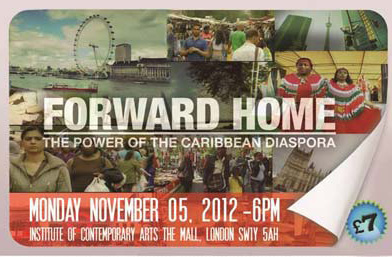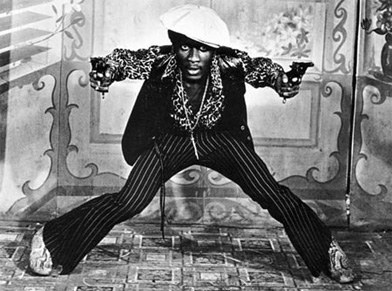Lights, Camera & Action….Caribbean Film Spotlight
Mawnin Neighbour…Caribwood
Who could have forgotten the international mass hysteria that surrounded the YouTube viewing of the popular Trini puppet drama, Santana? Nor the word for word narration that followed as the puppet drama series turned into film, toured its international screening, debuting at the Tabernacle in West London early this year? Well, safely speaking for the masses, one can say that the memories of those famous ones liners coupled with the well-known characters are still remembered and the ingenuity behind the team at LEXO TV is still admired.
 The film industry is well-known for having its geographical holds in three of the largest land masses on earth, Hollywood, Bollywood and Nollywood and having the most coveted screening invitation to its festivals. However lying on the geographical region that is North/Latin America, the Caribbean whilst not having yet adopted its own unique portmanteau, can boast in having long ensnared a piece of the film industry and hosting its own 7th annual local Trinidad & Tobago film festival and international screenings.
The film industry is well-known for having its geographical holds in three of the largest land masses on earth, Hollywood, Bollywood and Nollywood and having the most coveted screening invitation to its festivals. However lying on the geographical region that is North/Latin America, the Caribbean whilst not having yet adopted its own unique portmanteau, can boast in having long ensnared a piece of the film industry and hosting its own 7th annual local Trinidad & Tobago film festival and international screenings.
‘Caribwood – our made up word for the Caribbean Film Industry 😉 ‘
 A 15-20 minute, walk away from Buckingham Palace, the Institute of Contemporary Arts most recently threw its doors open to the London screening of Lisa Wickham’s FORWARD HOME: The Power of the Caribbean Diaspora, a documentary film filmed in 9 countries across Europe, North America and the Caribbean, showcasing the economic power of Caribbean people, living in global cities. This is not the first screening of its kind to be held in the grand architectural buildings of UK, having recently showed its first UK screening at one of the leading universities of England, the University of Oxford and having already had successful international premieres in Toronto, Barbados, Suriname, USA, Guadeloupe, Columbia, Tanzania, El Salvador, Jamaica, Brussels and T&T Film Festival.
A 15-20 minute, walk away from Buckingham Palace, the Institute of Contemporary Arts most recently threw its doors open to the London screening of Lisa Wickham’s FORWARD HOME: The Power of the Caribbean Diaspora, a documentary film filmed in 9 countries across Europe, North America and the Caribbean, showcasing the economic power of Caribbean people, living in global cities. This is not the first screening of its kind to be held in the grand architectural buildings of UK, having recently showed its first UK screening at one of the leading universities of England, the University of Oxford and having already had successful international premieres in Toronto, Barbados, Suriname, USA, Guadeloupe, Columbia, Tanzania, El Salvador, Jamaica, Brussels and T&T Film Festival.
 The film industry in the Caribbean has long held its own and the first acclaimed roll of film was produced and directed in Jamaica. In 1972, Perry Henzell became the first director to produce the first Jamaican crime film featuring Jimmy Cliff, The Harder They Come. In 1976, adapted from the stage play by director Trevor Rhone, Smile Orange made its debut, despite having being criticised by the New York times for its awkward technical cinematographic failures. Whilst the Caribbean film industry might have kept quite amongst the burgeoning international film industry, industry bureaucracy, recognition, in the interim it has kept its hold birthing a pool of talent, future acclaimed directors, film studios and media entities.
The film industry in the Caribbean has long held its own and the first acclaimed roll of film was produced and directed in Jamaica. In 1972, Perry Henzell became the first director to produce the first Jamaican crime film featuring Jimmy Cliff, The Harder They Come. In 1976, adapted from the stage play by director Trevor Rhone, Smile Orange made its debut, despite having being criticised by the New York times for its awkward technical cinematographic failures. Whilst the Caribbean film industry might have kept quite amongst the burgeoning international film industry, industry bureaucracy, recognition, in the interim it has kept its hold birthing a pool of talent, future acclaimed directors, film studios and media entities.
Of Trinidadian descent, Horace Ové was one of the leading black independent film-makers to emerge in Britain with feature films including Baldwin’s Nigger in 1969 later used as a course material for London film students. He was named Best Independent Film and Television Maker by the British Film Institute in 1988 and later returned to the Caribbean to help develop the film industry there.
Fresh of Notting Hill Carnival 2012, the British Film Institute welcomed a collective of young, innovative film-makers from Jamaica and St Lucia, the New Caribbean Cinema to premier as part of ‘Jamaica We Love You’ weekend in September, their first feature multi award winning film Better Mus Come and Ring Di Alarm.
 As part of the Black History Month celebrations in October, the borough of Lambeth held a few screenings showcasing the Caribbean culture, most particularly a critical look at Trinidad & Tobago’s present-day Carnival, The Other Side of Carnival and Fifty in Fifteen, a look at the contribution made by people of T&T during the last 50 years of Independence. ChantiMedia an umbrella creative agency focused on the sharing and promoting of Caribbean arts and culture through film, recently featured What The Times Cover Girl Did Next a look at the pulsating carnival culture.
As part of the Black History Month celebrations in October, the borough of Lambeth held a few screenings showcasing the Caribbean culture, most particularly a critical look at Trinidad & Tobago’s present-day Carnival, The Other Side of Carnival and Fifty in Fifteen, a look at the contribution made by people of T&T during the last 50 years of Independence. ChantiMedia an umbrella creative agency focused on the sharing and promoting of Caribbean arts and culture through film, recently featured What The Times Cover Girl Did Next a look at the pulsating carnival culture.
Whilst the government more so in Trinidad is fighting with the nation on squeezing the freedom and growth of the film industry, it is time that we as a nation saw the film industry as a something of value to the Caribbean diaspora. The art of storytelling is embedded heavily in the Caribbean culture and many stories unfold in the back yards of island residents, streets and fellow islanders abroad. Whilst the media continues to attempt to rewrite the Caribbean history, it is important that the Caribbean diaspora maintains its hold and develops this evolving and growing industry. The need to tell our story, through film provides an opportunity for Caribbean people to invite the world in, define their culture and let it be understood better.
The film industry of the Caribbean has potential and with strong ties and partnerships as evidenced by international screenings the stories of the Caribbean can be exported to the world while making a viable living for regional film makers, locals and contributing to the economies of the islands.
The power of film lies in the fact that, like pictures, moving images can last a lifetime, revolutionise and can be seen by the world around. As the Caribbean industry gains its foothold in the film industry and contends with the emerging world that is new media, it is down to us as people to support and contribute to this lasting legacy.
The future is bright and lit with talent and creative flair. Lest we not forget, not only can the Caribbean culture boast of a film industry, it can showcase to the world, the many talented actors and actresses that carry a Caribbean lineage. The UK Caribbean scene, can boast to having had Heather Headley, a Trinidadian-American R&B and soul singer, songwriter, record producer, and actress star in the BodyGuard Musical, a theatrical production based on the smash hit film starring Kevin Costner and the late Whitney Houston.










Comments
No comment yet.